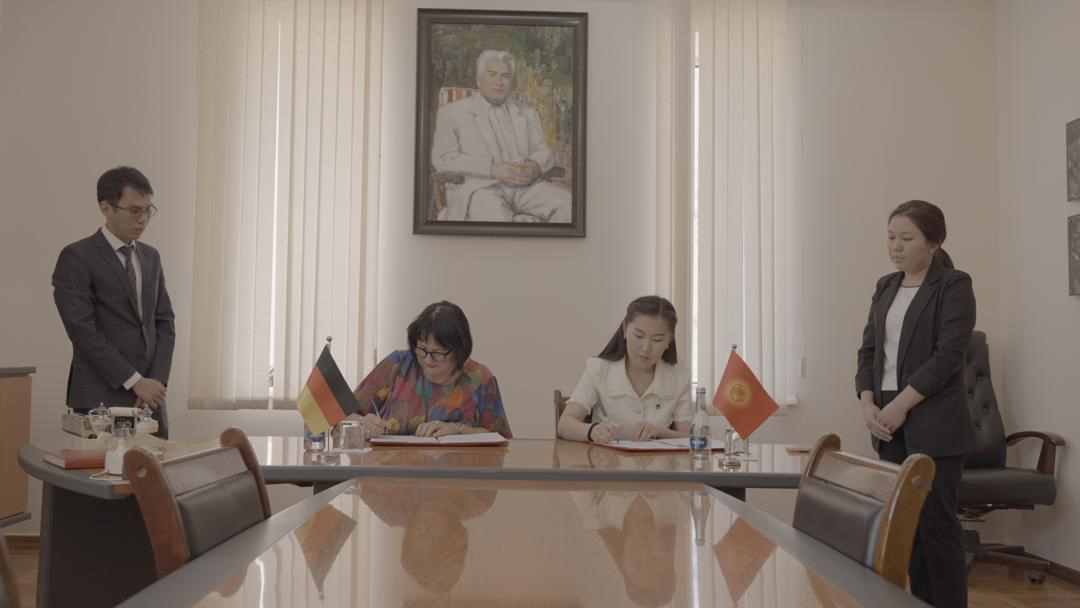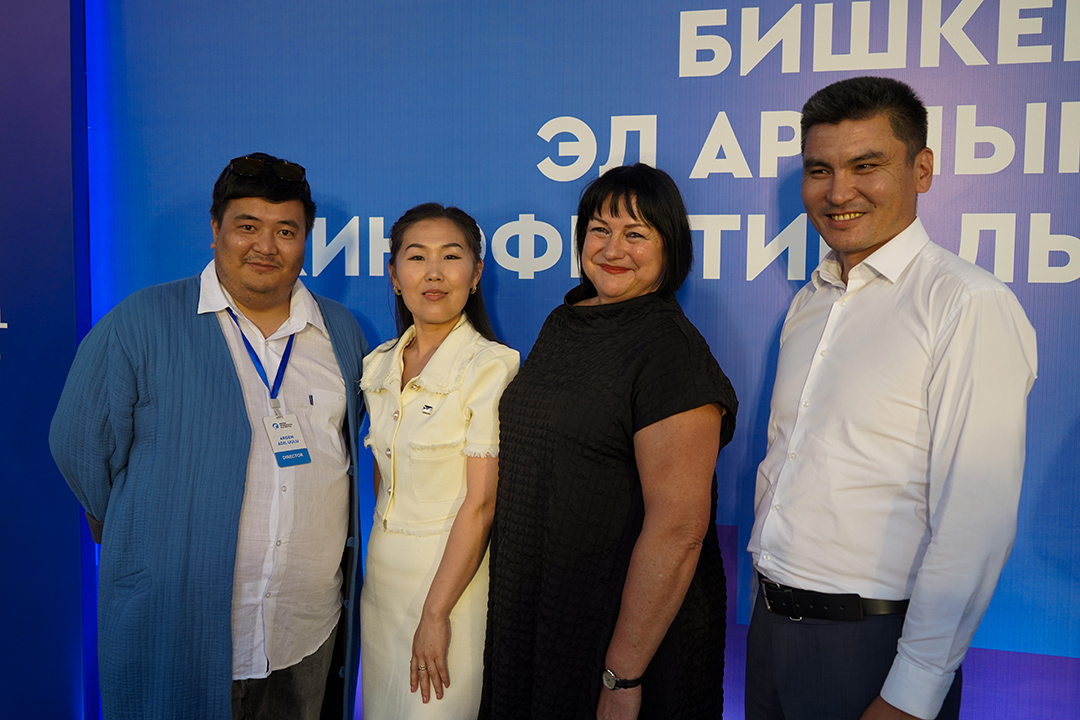Closer cooperation between Germany and Kyrgyzstan
A memorandum was signed at the Bishkek International Film Festival
German filmmakers, producers and talents are being offered closer cooperation with an emerging market in Central Asia, after a landmark deal between German Films and Kyrgyzstan was signed.
Simone Baumann, CEO of German Films, signed a memorandum of cooperation with the National film studio “Kyrgyzfilm” during a visit to the country’s capital, Bishkek, in June.
“The request came from the Kyrgyz side,” Simone said. “It followed a meeting I had in Berlin with the Kyrgyz Ambassador to Germany, Omurbek Tekebaev.”

© German Films
The idea of the seven-point agreement is to promote closer cooperation in cultural and film projects between the two countries, including technical and training exchange, film festival participation, and project development.
“The goal is to meet regularly – maybe they send some people to Germany, and we send some there,” Simone added.
A fluent Russian speaker – she studied in the Soviet Union in the late 1980s – Simone says that Kyrgyzstan is keen to develop its own film industry and identity as the Central Asia region increasingly moves away from cultural influences of Russia. The country has a range of bilateral cultural and film agreements with European countries, with the latest signed with the French National Film Centre (CNC) in Cannes last May.
“We can help Kyrgyzstan in terms of film industry contacts,” Simone notes. “Most European films for distribution in Central Asia are still sold to Russian distributors and then re-sold here.”
Since Russia launched its unprovoked attack on Ukraine in February 2022, German Films has had a policy of not supporting any films sold via Russian distributors. Helping Kyrgyz distributors buy film directly will be a key part of the cooperation.
There could also be support for dubbing films into Kyrgyz. Many Kyrgyz people speak Russian, and in Bishkek it widely used. The country’s constitution recognises both Kyrgyz and Russian as official state languages, but there is now a move to use Kyrgyz more widely – and dubbing films into the native language is part of that.

© German Films
The country has an active local film industry, where private producers churn out genre films – comedies, thrillers, and dramas – aimed at local audiences. The films are highly popular, giving local language movies second place at the box office after Hollywood productions. Last year 159 Hollywood movies were released across the country’s 53 main cinemas (alongside 134 smaller local cinema halls, mostly situated in rural areas); there were 39 Kyrgyz releases, and 38 from France, 35 from the UK. Germany was in eighth place with 12 releases, just behind Canada’s 16 movies.
“We would like to see the number of German releases a little higher,” Simone says with a smile. It is, she adds, “an interesting moment” for German films. “Russia is over, and we have downsized our activities with China as we sell few films to them, and with censorship an extended cooperation does not really make sense anymore. That is why Kyrgyzstan or Kazakhstan – which also has an active film industry – are interesting for us in this context. They can become the connecting point between Asia and Europe. It is an important moment for them to increase regional cooperation and with Europe too.”
Aida Usonova, Director of Kygryzstan’s national film studio, Kyrgyz Film, who was one of the signees of the cooperation agreement, says the country is poised for an expansion of feature and documentary productions.
The studios, founded in 1941, produce three feature length films a year, in addition to dozens of shorter documentary and animation productions. There are plans to construct a new sound stage and modernise other facilities at the three-hectare site, built on an inner-city site in Bishkek in the 1980s.
“Although we, as a state film studio, only produce festival films that are state-funded, we are a key provider of facilities for the 40 privately produced Kyrgyz features that are made every year,” Usonova said. Appointed three months ago, Usonova trained as an economist before starting at the studios 15 years ago as a secretary. Today, she is part of a team of film professionals in their 30s and 40s who work at the studios.
Young professionals were also very much in evidence at the second edition of the Bishkek International Film Festival, which ran June 11-16, 2024. Designed to both showcase Central Asian cinema and international fare (with a focus on Iranian cinema this year), the festival attracted dozens of international guests and jury members, hosted a Central Asian pitching event for new projects, and celebrated the 100th anniversary of the founding of the nation in 1924 – then known as the Kara-Kirghiz Autonomous Region, which was part of the Soviet Union.
Representing film from all five of the Central Asian republics – including Turkmenistan, which contributed a drama set during the Second World War – the regional competition varied in quality from lengthy local audiences pleasers such as Ruslan Akan’s Kyrgyz-produced road move PARADISE AT MOTHER’S FEET about a simple-minded man who sets out to take his aged mother to Mecca for the Hajj pilgrimage on foot, to Kyrgyz director Dalmira Tikepbergen’s critically-acclaimed semi-autobiographical THE GIFT.
Screening in the international competition, another Kyrgyz film BRIDE KIDNAPPING by Mirlan Abdykalykov, tackled a challenging social subject: the practice of forcibly seizing and raping young women to make them marry a man that is not of their choice. The tradition is still prevalent in rural areas of the country. A controversial and difficult subject, the producers could not find actors to play the lead roles. In the end, the casting director played the young woman (who is discretely seen in a disturbingly violent rape scene), and a soundman played her kidnapper and rapist.
Nick Holdsworth
